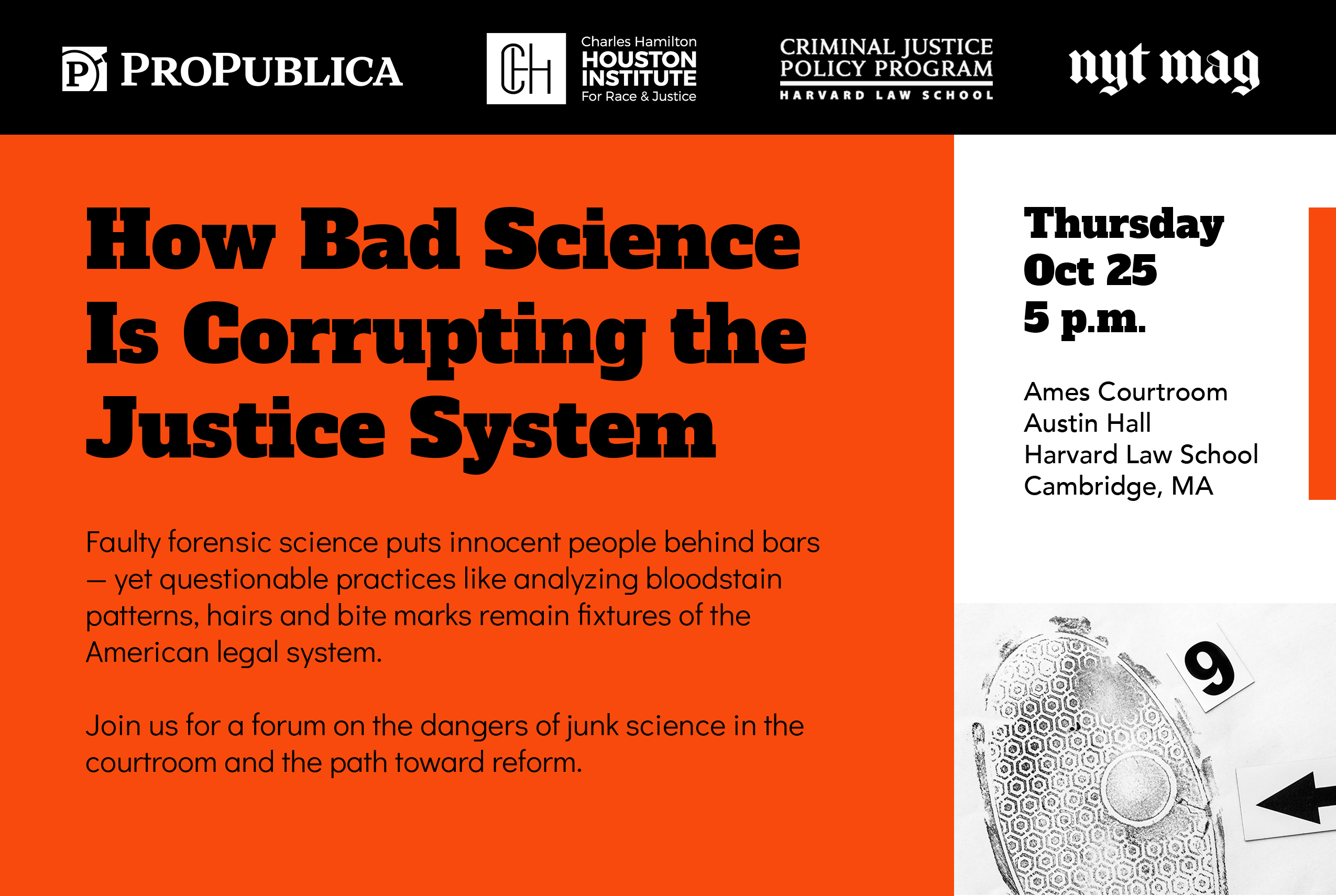📰 Read a summary of the event by ProPublica.
Many forensic disciplines are used in courtrooms despite grave questions about their accuracy and reliability. Faulty forensic science is the second-most common contributing factor to wrongful convictions, found in nearly half of DNA exoneration cases — yet questionable practices like analyzing bloodstain patterns, hairs, bite marks and tire impressions remain fixtures of the American legal system.
Join ProPublica, the Charles Hamilton Houston Institute for Race and Justice, and the New York Times Magazine for an event that will look at faulty forensic testimony in the courtroom, its devastating consequences and efforts around the country that show the potential for reform. Co-sponsored by the Criminal Justice Policy Program.
Featuring:
- Nicole Cásarez, Board Director of the Houston Forensic Science Center
- Pamela Colloff, Senior Reporter at ProPublica & Writer at Large for New York Times Magazine
- Hon. Nancy Gertner, Harvard Law School Senior Lecturer & ret. federal district judge
- Radha Natarajan, Executive Director of the New England Innocence Project
- Moderated by Katy Naples-Mitchell, Houston Institute Legal Fellow
Panelist Bios:
Nicole Cásarez is an attorney and a communication professor at the University of St. Thomas, where she teaches journalism, wrongful convictions and media law. She serves as the board chair of the Houston Forensic Science Center local government corporation, which oversees the City of Houston’s independent crime lab. Cásarez writes and speaks frequently about First Amendment, privacy and criminal justice issues, and in 2009, she was elected to the American Law Institute. She received national and international media attention in connection with her work on the case of Texas death row inmate Anthony Graves, who was exonerated in 2010.
Pamela Colloff is a senior reporter at ProPublica and a writer-at-large at The New York Times Magazine. Prior to joining ProPublica and the Times in 2017, she was an executive editor and staff writer at Texas Monthly. Her work has also appeared in The New Yorker and has been anthologized in “Best American Magazine Writing,” “Best American Crime Reporting” and “Next Wave: America’s New Generation of Great Literary Journalists.” At Texas Monthly, Colloff earned a National Magazine Award in Feature Writing for her 2012 story, “The Innocent Man.” In 2014, the Nieman Foundation for Journalism at Harvard University awarded her the Louis M. Lyons Award for Conscience and Integrity in Journalism.
Nancy Gertner is a former U.S. federal judge who built her career around standing up for women’s rights, civil liberties and justice for all. Gertner was appointed to the federal bench of the U.S. District Court of Massachusetts by President Bill Clinton in 1994. She retired from the bench in 2011 to teach at Harvard Law School. Named one of “The Most Influential Lawyers of the Past 25 Years” by Massachusetts Lawyers Weekly, Gertner has published widely on sentencing, discrimination, and forensic evidence, as well as women’s rights and the jury system. She has received numerous awards, including the 2018 Thurgood Marshall Award from the American Bar Association. The Marshall Award has been given to one other woman, Justice Ruth Bader Ginsburg.
Radha Natarajan is the executive director of the New England Innocence Project (NEIP), whose mission includes providing pro bono legal representation to people who have claims of actual innocence, and advocating for reforms that will reduce the incidence of wrongful convictions. Prior to joining NEIP as its staff attorney, Natarajan spent 12 years as a public defender. She has used her expertise in eyewitness identification to conduct trainings across the country, including at the National Forensic College, in a systemic effort to reduce wrongful convictions. She is a member of the Massachusetts Supreme Judicial Court Standing Committee on Eyewitness Evidence, an advisory committee tasked with updating the Court on new research and making scientifically-based recommendations for reform.
Katy Naples-Mitchell (moderator) joined the Houston Institute as a legal fellow after clerking for Judge Anne E. Thompson, U.S. District Judge for the District of New Jersey. Naples-Mitchell received her J.D. from City University of New York (CUNY) School of Law, where she served as Managing Articles Editor for the CUNY Law Review. As chapter director of the CUNY Law International Refugee Assistance Project, she oversaw a dozen refugee cases and resettled clients during the implementation of President Trump’s Muslim Travel Ban in January 2017.
